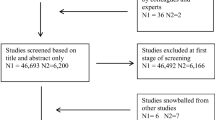Abstract
In 2007, we published the first survey on children in Germany. In that “1st World Vision Children Study,” we decided to perform more than just a representative and standardized questionnaire survey of 1,600 children aged 8–11 years. We also chose to carry out qualitative interviews linked together with a game, and to extend these interviews to include children from the age of 6 years onward. One important finding of the 2007 survey was the devastating impact of social inequality on children’s lives and the growing numbers of children who experience poverty. In 2010, we published a new survey of children, the “2nd World Vision Study.” This covered a sample of 2,500 children aged 6 to 11 years. We added some questions on the feelings and everyday life experiences children have when they are poor. We also included questions on respect, and self-efficacy. Both studies are based on a concept of child well-being. We consider that the World Vision Study of 2010 delivers one major finding: What contributes to the well-being of children in Germany is the granting of freedoms and the experiences of autonomy embedded among experiences of parental care within committed relationships. Hence, it is precisely a combination of freedom and parental care, of co-determination and protection that leads to a high life satisfaction in 6- to 11-year-olds.
Similar content being viewed by others
Notes
The third survey will be published in 2013.
References
Albus, S., Andresen, S., Fegter, S., & Richter, M. (2009). Wohlergehen und das "gute Leben" in der Perspektive von Kindern. Das Potenzial des Capability Approach für die Kindheitsforschung. Zeitschrift für Soziologie der Erziehung und Sozialisation. Schwerpunktheft Capability Forschung, 29(4), 46–358.
Alt, C., Schneider, S., & Steinhübl, D. (2004). Das DJI-Kinderpanel - Theorie, Design und inhaltliche Schwerpunkte. Zeitschrift für Familienforschung, 16(2), 101–110.
Andresen, S., & Fegter, S. (2011). Children growing up in poverty and their ideas on what constitutes a good life: Childhood studies in Germany. In A. Ben-Arieh & B. Joo Lee (Eds.), Child Indicators Research. The official journal of the International Society for Child Indicators. (1/2011, p. 1–19). Dordrecht: Springer.
Andresen, S., Otto, H.-U., & Ziegler, H. (2008). Bildung as human development: an educational view on the capabilities approach. In H.-U. Otto & H. Ziegler (Eds.), Verwirklichungschancen und Befähigungsgerechtigkeit in der Erziehungswissenschaft. Zum sozial-, jugend- und bildungstheoretischen Potential des Capability Approach (pp. 165–197). Wiesbaden: VS.
Axford, N. (2008). Exploring concepts of child well-being: Implications for children’s services. Bristol: The Policy Press.
Ben-Arieh, A., & George, R. (Eds.). (2006). Indicators of children’s well-being: understanding their role, usage, and policy influence. Dordrecht: Springer.
Biggeri, M., Ballet, J., & Comim, F. (2010). The capability approach und research on children: Capability approach and children’s issues. In Andresen, S., Diehm, I., Sander, U., Ziegler, H. (Eds.), Children and the Good Life (pp. 75–90). Dordrecht, New York: Springer.
Bradshaw, J. (2011). The well-being of children’s in the UK. Bristol: The Policy Press.
Bradshaw, J., Hölscher, P., & Richardson, D. (2007). An index of child well-being in the European Union. Social Indicators Research, 80(1), 133–177.
Finkelhor, D. (2008). Childhood victimization. Violence, crime and abuse in the living of young people. Oxford, New York: Oxford University Press.
Garbarino, J. (2008). Children and the dark side of human experience: Confronting global realities and rethinking child development. New York: Springer.
Lareau, A. (2003). Unequal childhoods: Class, race and family life. Berkeley: University of California Press.
Nussbaum, M. (1999). Gerechtigkeit oder das gute Leben. Frankfurt: Suhrkamp.
Nussbaum, M. (2000). Women and human development: The capabilities approach. Cambridge: Cambridge University Press.
Sen, A. (1985). Well-being, agency and freedom. The Dewey Lectures 1984. Journal of Philosophy, 82(4), 169–221.
Unicef. (2007). Child poverty in perspective: An overview of child well-being in rich countries, Innocenti Report Card 7. Florence, Italy: UNICEF Innocenti Research Centre.
Unterhalter, E. (2003). Education, capabilities and social justice. Paper commissioned for the EFA Global Monitoring Report 2003/4. The Leap to Equality. http://unesdoc.unesco.org/images/0014/001469/146971e.pdf. Accessed 03 February 2010.
Vincent, C., & Ball, S. J. (2006). Childcare, choice, and class practices: Middle-class parents and their children. London: Routledge/Chapman & Hall.
Walker, M. (2004). Insights from and for education: the capability approach and South African girls’ lives and learning. Paper presented at the 4th International Capability Approach conference. Pavia: University of Pavia.
World Vision (2007). Kinder in Deutschland 2007. 1. World Vision Survey. Wissenschaftliche Leitung: Klaus Hurrelmann und Sabine Andresen. Frankfurt: Fischer Taschenbuch Verlag.
World Vision (2010). Kinder in Deutschland 2010. 2. World Vision Survey. Wissenschaftliche Leitung: Klaus Hurrelmann und Sabine Andresen. Frankfurt: Fischer Taschenbuch Verlag.
Author information
Authors and Affiliations
Corresponding author
Rights and permissions
About this article
Cite this article
Andresen, S., Hurrelmann, K. & Schneekloth, U. Care and Freedom: Theoretical and Empirical Aspects of Children’s Well-Being in Germany. Child Ind Res 5, 437–448 (2012). https://doi.org/10.1007/s12187-012-9154-6
Accepted:
Published:
Issue Date:
DOI: https://doi.org/10.1007/s12187-012-9154-6




